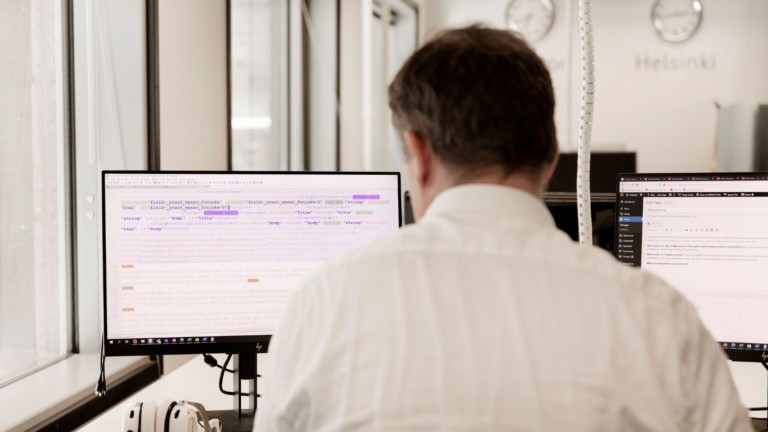Aimed at language service industry students who are nearing the end of their studies or who have recently graduated, DelinguaLAB is an internship programme that we usually organise twice a year. Through the programme, we look for future talents and diamonds in the rough for various roles in the language service industry, such as project managers, translators and interpreting coordinators.
We provide LAB participants with knowledge and skills that can only be acquired by working in an industry company. The programme acts a gateway and offers valuable insights into industry tasks and tools. Depending on the situation, we provide translators with jobs, which we compensate in line with industry practices and, through the LAB programme, it’s possible to secure an internship at our office in project management or other tasks. We believe that sharing information about jobs in the language service industry gives us something of value in return: new professionals who are ready to take on roles that would otherwise be difficult for graduates to access.
This autumn, DelinguaLAB kicked off for the ninth time – the first LAB was organised in 2018. Over the years, DelinguaLAB has acquired near-legendary status, and LAB alumni have been in good demand in working life.
DelinguaLAB alumni reflect on their experiences
We interviewed a few of our LAB alumni, Tiia, Taru and Sohvi, about their experiences, the lessons they’ve learned, their current situation and the impact the LAB programme has had. Few people get to really familiarise themselves with the language service industry during their studies, and it can be difficult to gain work experience in the industry. “I applied for the DelinguaLAB programme because it presented an opportunity for me to get to know the industry better in a safe environment and to immediately get to work with actual translation assignments,” says Taru. “I wanted to gain work experience and make working life connections before the end of my studies,” continues Tiia. That is precisely why we created the programme, so that students could become familiar with the sector, too.
The purpose of the programme is also to present a realistic picture of the language industry. “My perception was perhaps a little outdated, so an update was definitely what I needed. At the university, they painted a rather bleak picture of working life, but through the DelinguaLAB programme, I got to see that there’s still plenty of work out there,” says Sohvi. Globally, the language service industry is growing at an annual rate of 6–7%, so there is indeed demand for competent professionals. Universities still focus heavily on just translation and interpreting. However, in addition to translators, other experts are needed in the industry as well, such as language technology professionals, project managers, vendors and interpreting coordinators. Among other professionals, these are what we’re looking for through the LAB programme.
Through the programme, our alumni have learned concrete lessons and gained tangible benefits. “The lectures were extremely useful. Through the programme, in just a few months, I gained a lot of work experience as a translator and loads of tips for my future working life. For example, I learned about the importance of networking, the differences between translation agencies and light entrepreneurship and about the various practices related to translation,” says Taru. Sohvi says she has learned a lot about the entire language service industry and the tools used in it: “I learned about the translation process and what that includes, and what kinds of translation needs and implementations exist at present. I was also able to take advantage of the skills learned in the programme in my daily work in project management at Delingua.”
We love to hear about what’s happening in the careers of all our DelinguaLAB alumni after they complete the programme. Many have ended up in very interesting positions. These include freelance translators as well as linguists working for the government or even international companies. Many also complete assignments for us, and they’ve said that it was easier to take the step to becoming a freelance translator after the programme. “It was easy to set up as an entrepreneur knowing that you already had one customer,” says Tiia. Currently, Delingua’s localisation team employs two LAB alumni, Sohvi as Localisation Coordinator and Ari as Localisation Manager.
Greetings to all LAB programme participants
Our alumni encourage anyone interested in the industry to apply to join the programme. “You should apply, even if you don’t know anything about the language service industry, as you may find a new direction for your career!” says Sohvi. Taru recommends the DelinguaLAB programme to anyone who is interested in the language service industry and wants to try their hand at everyday translation work. “Translation agency internships are definitely the most important part of a translator’s studies. Good luck to everyone participating in the current LAB programme – make the most of the opportunity and don’t forget to try new things!” says Tiia.






